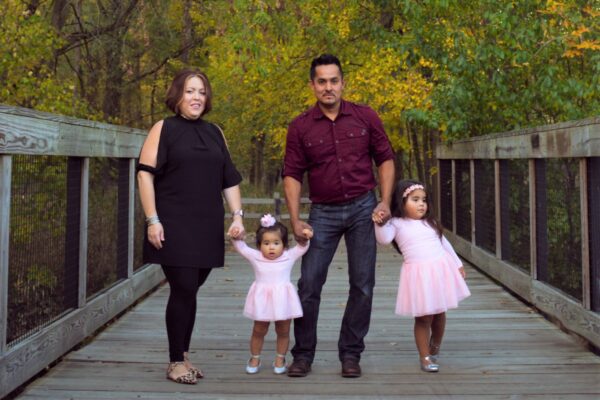Oscar Xirum-Sanchez saw his life change in a flash. It happened when he was pulled over during a traffic stop last August, and then turned over to U.S. Immigration and Customs Enforcement. He’s been sitting in the Calhoun County Jail ever since, helplessly watching COVID-19 spread through the facility in southwestern Michigan.
Mr. Xirum-Sanchez, a native of Guatemala who came to the U.S. more than 18 years ago seeking a better life, remains locked up because U.S. Immigration and Customs Enforcement (ICE) steadfastly refuses to allow his release – and the release of others being held under similar circumstances – despite the danger continued incarceration poses to him and the immense harm it is causing his family.
Mr. Xirum-Sanchez, 41, and his wife have been married for five years. She and their daughters, ages three and five, are American citizens. Until his detention, he was a foundational support to his family.
In early October, Mr. Xirum-Sanchez began to fear COVID-19 had entered the Calhoun County Jail. The first signs of trouble appeared just after three men were transferred into Mr. Xirum-Sanchez’s housing unit.
H-Pod, like nearly all other units at the jail, is a place where social distancing is impossible. The people in ICE detention say about eight men are crammed inside each cell there.
Like Mr. Xirum-Sanchez, two of the three new men who transferred in were locked up because of ICE, which is not uncommon at the Calhoun jail. Of a total jail population of about 350 people, approximately 135 of them are “ICE detainees,” according to a recent count jail officials provided to U.S. Judge Judith Levy in a class action lawsuit against ICE brought by the ACLU and the law firm Paul Weiss earlier this year.
The goal of the litigation is to both get the most medically vulnerable individuals released, and to ensure that protections are in place to keep everyone else who remains detained as safe as possible.
So far, because of rulings made by Judge Levy, 31 medically vulnerable people have been able to return to their communities and reunite with their families. But many more medically vulnerable people remain inside, including Mr. Xirum-Sanchez.
His medical issues include kidney and liver problems as well as high blood pressure. Already terrified about the dire threat COVID-19 poses, his fears grew even more intense the week of October 5, when one of the new transfers became ill.
Jail officials reacted slowly. Even after a second individual became ill – in the midst of the global pandemic - the guards waited a full week to alert the medical staff that the men, who had been pleading for help, had been exhibiting symptoms, according to sworn declarations provided by people being detained at the jail.
The same happened to Mr. Xirum-Sanchez. He began experiencing symptoms the week of October 16, but despite his vulnerability, was forced to spend several days in agony, likely infecting others around him, before he was even tested for COVID-19.
An even more shocking fate awaited Alberto Hernandez-Guerrero, who is in the same unit as Mr. Xirum-Sanchez. Mr. Hernandez-Guerrero told a doctor on October 13 that he was experiencing headaches, body aches, dry coughing, painful and watery eyes, and a sore throat.
Instead of testing him for COVID, or providing any medication, the doctor sent Mr. Hernandez-Guerrero back to H-Pod. Unbelievably, he was made to resume his duties of delivering food trays to people throughout the facility. He wasn’t tested until six days later. At that point he was too ill to get out of bed.
People housed at the facility reported that they were not required to wear masks except when they were in the hallways, meaning “we did not wear masks in the common areas, in our cells, in the bathrooms, or while we were eating,” according to court records.
Bizarrely, officials equated the circumstances of 20 people housed in a jail unit to that of a “family.”
“Once they make it to their general housing unit and make it through quarantine and testing, at that time it's almost like, you know, as a family we wouldn't be wearing masks in the house with my kids or so forth,” Chief Deputy Randy Hazel, the jail’s administrator, told the Court during a hearing.
The masks, made of paper and intended to be disposable, were being used for months at a time without being replaced.
It was also reported by people detained, “The guards and other staff at Calhoun rarely wore masks. When guards did wear masks, they were worn only sporadically … with masks hanging off one ear instead of covering their faces. This was true even when the guards and staff were within 6 feet of detainees.”
By early November, at least 40 individuals detained have reportedly tested positive for COVID in the preceding few weeks. Mr. Xirum-Sanchez was one of them.
“I have not been able to shower for approximately three days. I have still not been given any hand sanitizer,” he said at one point. “I am in a room with stale air without any circulation. There is nothing but a toilet.”
“I am scared about the way things are being handled. I am frightened for my health,” he added. “I worry that I am in the medical unit now because my condition is severe and I am dying, but nobody is telling me anything.”
“The staff is not doing anything to keep us informed and they don’t seem to be doing anything to stop the spread of the virus. It seems they are more concerned with preventing information about what is happening here from spreading than they are about preventing COVID-19 from spreading.”
“It's a tragedy that was completely predictable, and, indeed, almost inevitable, given ICE's insistence on warehousing human beings in jail simply because they're trying to stay in America with their families,” ACLU of Michigan attorney Miriam Aukerman told Judge Levy at a hearing on October 26.
Although he survived, Mr. Xirum-Sanchez says he has been told by medical personnel at the jail that his lungs were severely damaged, and that should be a cause for concern going forward.
While they are the ones being placed directly in harm’s way, the people being detained by ICE aren’t the only ones suffering the consequences.
“This situation has been very hard on all of us,” said Arleen Xirum, Mr. Xirum-Sanchez's wife.
Their two daughters have been severely traumatized by what happened to their father.
“Every time I leave the house, they start crying because they are terrified that what happened to their dad will happen to me, and that I will leave and not come back,” she said in a recent phone interview with the ACLU of Michigan.
Along with trying to keep their fears in check and provide comfort in their father’s absence, she is struggling to hold things together.
“Things have been really tough,” said Ms. Xirum, a medical receptionist who lives in Wyoming, Michigan.
Already prone to anxiety attacks before her husband was hauled away, and reliant upon him to help her deal with those episodes, she is doing her best to deal with the depression Oscar’s detention has caused, an unnecessary addition to the uncertainty of what awaits regarding his immigration status. Compounding all this stress is the relentless fear for her husband’s life while being locked up.
“I don’t know why my husband is being treated this way,” she said. “And to see human beings treating other people like this is just so disappointing.”
With the class action lawsuit still under way, and the COVID-19 pandemic still putting lives in jeopardy, the ACLU of Michigan is continuing to submit bail applications to have medically vulnerable people released from ICE detention at the Calhoun County Jail.



